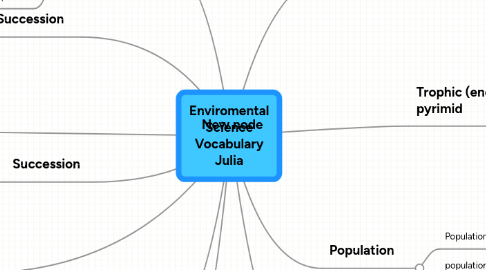
1. New node
2. Biodiversity
2.1. Genetic Biodiversity
2.2. Species Biodiversity
2.3. Ecosystem Biodiversity
2.3.1. abiotic and biotic factors
2.3.1.1. limitting factors
2.4. Hot spots
2.5. indicator species
2.5.1. threatened species
2.5.1.1. endangered species
3. food web
3.1. food chain
4. Ecological Succession
4.1. Primary succession
4.2. secondary succession
5. Succession
5.1. pioneer species
5.2. climax community
6. Water Pollution
6.1. runoff
6.2. erosion
6.3. urbanization
6.4. organic polution
6.5. inorganic polution
6.6. watershed
6.7. impermeable
7. Water Sources
7.1. aquifer
7.2. point source
7.3. non point source
7.4. natural resouce
7.5. renewable resource
7.6. nonrenewable resouce
8. Water Purification
8.1. wetlands
8.2. desalination
9. Level of organization
9.1. Organism
9.1.1. A living thing (hydra, rabbit, cat, and decomposer)
9.2. Population
9.2.1. A group of the same organisms (fish & rabbits)
9.3. Community
9.3.1. A group of different organisms that interact with eachother (deer & squirrel
9.4. Ecosystem
9.4.1. Where all the biotic and abiotic factors are interacting (forest, tide pool tree)
9.5. Biome
9.5.1. Geographic area with many ecosystems based on climate or elevation (Tundra, desert, rainforest, marine,forest, fresh water, savanna, temperature deciduous forest, coniferous forest)
10. Trophic (energy) level pyrimid
10.1. trophic levels
10.1.1. Producers
10.1.2. 1st degree
10.1.2.1. primary consumers
10.1.3. 2nd degree
10.1.3.1. secondary consumers
10.1.4. 3rd degree
10.1.4.1. tertiary consumers
11. Population
11.1. Population growth
11.1.1. expotential growth
11.2. population growth rate
11.2.1. carrying capacity
